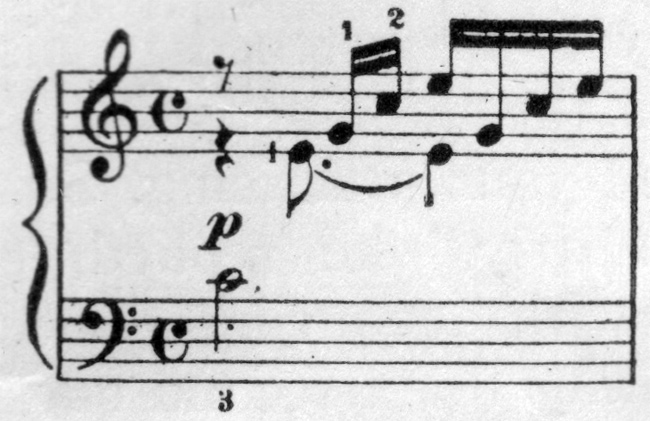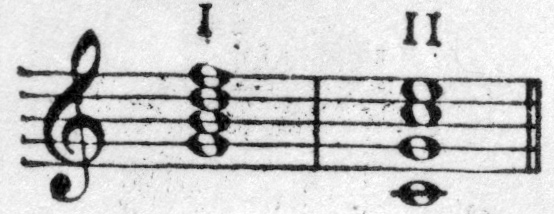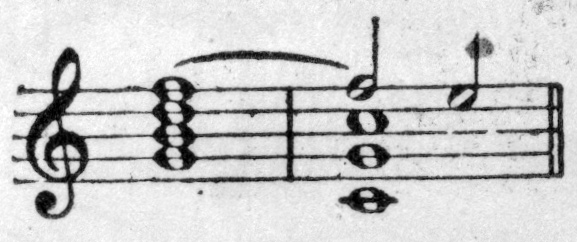Q. Sometimes I am bewildered by finding fingering marks now above the notes and then below the notes. What is the significance of fingering marks in different positions?—S. U.
A. In most instances where two marks appear the fingering above the notes is for the right hand while the fingering below the notes is for the left hand as in the following example.

Q. Please tell me something about the Saxophone which seems to be coming into such general use in combination with the piano, mandolin, banjo, violin and ‘cello in small orchestras seen at dances and in restaurants.—Inquirer.
A. This instrumental combination you describe is a peculiar indication of the elemental character of American musical taste. It is probably one of which the average composer of big orchestral scores would hardly dream, yet for its purpose it is unusually effective. The tonal effect is unique and often very pleasing. The introduction of the Saxophone can hardly be accounted for, much less its wide adoption. The Saxophone was invented by a Franco-Belgian instrument maker, Adolphe Sax, about 1840. It is now used in practically all bands where wood wind instruments are employed. It is a large pipe-shaped metal instrument with twenty lateral orifices covered by keys. It is played through a mouthpiece with a single reed of the clarinet kind. There are several members of the family from Soprano to Bass. It stimulates the tone of the ‘cello in many ways and is thus used in the combination mentioned as a kind of substitute. It is just creeping into the scores of master composers. Strauss uses it in the Domestic Symphony.
Q. What is Tonic Sol-fa?—S. C.
A. Tonic Sol-fa is a form of notation in letters instead of notes. It has gained great popularity in singing classes in England but has not come into such wide use in America. It was first devised by a Miss Glover, in 1812, and then improved in 1841 by the late Rev. John Curwin. The Tonic Sol-fa College in London has granted certificates to well on to one million students. The system has been found very successful in teaching certain phases of sight-singing, but since most of the music of the world is printed in staff notation and since the student is ultimately expected to know staff notation the Tonic Sol-fa system has decided limitations.
Q. Who is the greatest living French organist since Guilmant?—S. C.
A. The Etude is continually in receipt of requests for decision as to “Who is the greatest pianist?” “Who is the greatest violinist?” “Who is the greatest composer?”, etc. Decisions of this character are almost always matters of personal taste and opinion. We cannot attempt to say, and if we did decide it would not mean that we were right. Widor, Saint-Saëns and Bonet are three great French organists of the present. Saint-Saëns does comparatively little playing now, Widor confines his efforts pretty strictly to France, but Bonet is now upon a tour of the United States.
Q. Please name some British music written by German composers?—Canadian Reader.
A. We do not know what this reader can mean unless be refers to such things as Jubilee Overture, which includes God Save the King, Mendelssohn’s Scotch Symphony, Wagner’s Britannia Overture. Most all of the great German composers have written musical settings of English texts. The most beautiful setting of the time-old English poem Edward is by Loewe. Shakespeare and Burns have had many German settings.
Q. Somewhere I have seen an estimate of the number of notes in “Die Walküre” of Richard Wagner. Can you give me this information?—Question Mark.
A. No. We can, however, give you one estimate believed to be accurate on the entire “Ring” of four operas (“Das Rheingold,” “Siegfried,” “Die Walküre,” “Gotterdämerung”). These are said to include 984,843 printed notes. The mere physical work done by Wagner in recording his musical and literary works must have been prodigious. There are over ten volumes of literary works in addition to all his operas and instrumental works.
Q. What does “Andante Spianato” mean? —W. W. S.
A. Play slowly, in smooth and equal style.
Q. What is a suspension?—F. Z.
A. A suspension occurs when one or more parts of a chord are arrested for a time while the other parts of a chord move one step forward. To illustrate, the chord marked I is the dominant seventh chord of the key of C major. Its natural progression or resolution is to the Tonic Chord of C as shown at II:

However, if the topmost note of the chord I is arrested or suspended while the rest of the chord moves on we have the following which is a suspension. Note that the F in this case does not resolve to its natural resting place E until after the chord of which E is a part has been struck.
 This is only one of many forms of suspension but it illustrates the principle.
This is only one of many forms of suspension but it illustrates the principle.
Q. Who is the composer of “Cheer, Boys, Cheer?”—W. van M.
A. Henry Russell. Russell was born December 14th, 1812, at Sheerness, England, and died in London in 1900. He was a singer, pianist, organist and composer of much very popular music in his day. He studied with Rossini at Naples. His famous songs Life on the Ocean Wave and Cheer, Boys, Cheer have become authorized military music for certain occasions in England. Russell was a remarkable man in many ways. One of his accomplishments was to send hundreds of people from England and Canada to Australia, Tasmania and New Zealand. Many went in poverty to become very wealthy as time went on. Russell spent considerable time in America and was one of the organists of a Presbyterian church in Rochester, New York. His sons, Henry Russell (formerly impresario of the Boston Opera), and Landon Ronald, director of the New Symphony Orchestra and of the Guild Hall School of Music, have done much to carry on the traditions of their father.
Q. How much longer is the piano keyboard than the organ manual?—Etude Reader since 1888.
A. The piano is twenty-four keys longer. In other words the keyboard of the piano extends nine keys higher and fifteen keys lower.
Q. Who was the earliest known organ builder?—L. T.
A. The book of Genesis gives Tubal Cain the credit. “Jubal, he was the father of all such as handle the harp and organ.” In modern times the credit is given to Albert Van Os. He lived in Utrecht in the twelfth century. Organists call him “Albert the great.”
Q. Please tell me how to use orchestra parts written for cornets in A and B flat. I have several selections for cornets but do not know how to transpose or read them as first violin parts in the orchestra. Why are they not written in the same key and pitch as the violins since they are both treble clef?—E. C.
A. The cornet is what is known as a transposing instrument. For convenience in fingering a cornet comes in two different keys, A and B flat. But the fingering is always the same. It can be explained in this way. When the cornet fingers for C as it is written on the music, it sounds B flat on the B flat cornet and A on the A cornet. Consequently it is customary when music is written in flats to write for the B flat cornet and to make the part a whole tone higher than it sounds. For instance, when the piano is playing in F, one flat, the cornet part will be written in G and the B flat cornet will be used. When writing in the sharp keys it is customary to use the A cornet. For instance if the piano part were written in G then the A cornet would be written in B flat, a minor third higher. So that, if you want to read cornet parts upon the violin you will have to play the B flat cornet part a whole tone lower than written and the A cornet part a minor third lower than written, in order to exactly coincide with the piano.



